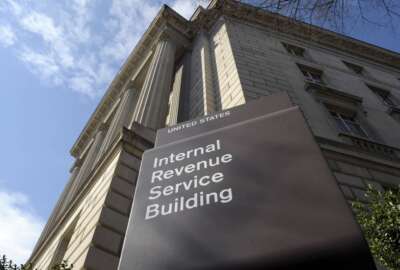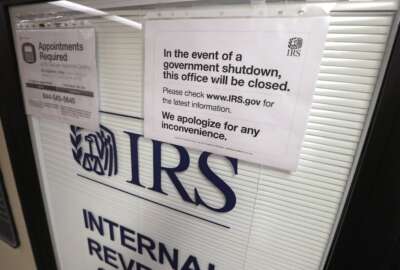IRS plans to furlough two-thirds of workforce if Congress triggers government shutdown
The IRS is planning to furlough most of its employees, if lawmakers don’t avert a government shutdown by the end of the week.
The IRS is planning to furlough most of its employees, if lawmakers don’t avert a government shutdown by the end of the week.
The agency, in updated contingency plans posted Thursday, anticipates it will furlough about two-thirds of its workforce — about 60,000 employees — if Congress triggers a government shutdown.
The IRS expects to keep about 30,000 employees working during a shutdown. Those employees will be paid through Inflation Reduction Act funds and fees — as well as revenue from private debt collectors the IRS is required by Congress to employ to collect certain outstanding tax debts.
A Treasury spokesperson said in a statement Thursday that a mostly furloughed IRS workforce will have “significant impacts” on taxpayers, and that most of the IRS’s core tax administration functions would stop during a shutdown.
Doreen Greenwald, national president of the National Treasury Employees Union, said Thursday that “it will be incredibly difficult for Americans to conduct business with the IRS during the impending government shutdown.”
Greenwald added that frontline IRS employees — including those who open the mail and process tax returns — are “preparing for the financial hardship that comes with missed paychecks, which is possible if the shutdown extends well into October.”
“NTEU remains concerned about the stress that thousands of IRS workers in every state are dealing with right now knowing their income is in jeopardy,” Greenwald said. “An additional worry is the impact the shutdown will have on IRS efforts to hire to prevent further backlogs and delays that American taxpayers are likely to experience.”
The IRS won’t process tax refunds during a shutdown — except in cases where electronically filed, error-free refunds can be direct-deposited automatically.
The IRS said there are about 10.5 million taxpayers who requested an extension for this year’s filing season — and face an Oct. 16 deadline to submit their tax returns.
The IRS will continue to receive mail during a government shutdown (the Postal Service is generally self-funded and would not be impacted), but the IRS will not respond to correspondence during a shutdown.
“Taxpayers who mail in correspondence to the IRS during this period should expect a longer delay for a response after the IRS reopens due to a growing correspondence backlog,” a Treasury spokesperson said.
The Treasury spokesperson said taxpayer phone calls to the IRS will go unanswered. The IRS in October answers about 46,000 phone calls every day.
The IRS would also shutter 363 Taxpayer Assistance Centers across the country. Taxpayers rely on these centers for free, in-person tax help from IRS employees.
In October, Taxpayer Assistance Centers open their doors to more than 5,000 individuals each day looking for assistance.
The Treasury spokesperson said IRS activities that were funded by the Inflation Reduction Act resources in fiscal 2023, or are excepted under longstanding governmentwide lapse in appropriations procedures, will continue.
The IRS will continue preparations for the upcoming filing season, including updating tax forms and IT systems.
Critical IT system functions that are necessary to protect taxpayer data will continue, as will some limited modernization initiatives funded by the IRA.
Hiring and training to prepare for the filing season will also continue.
IRS Commissioner Danny Werfel, speaking Wednesday at a summit on trust in government hosted by the Partnership for Public Service, said the agency under the Inflation Reduction Act faces an ambitious goal of hiring many employees in a short period of time.
The IRS planned to hire more than 10,000 employees this fiscal year, and about another 10,000 employees in fiscal 2024. Most of the hiring is focused on taxpayer services and enforcement.
“It is a very complicated high-wire act, to hire that many people. But it’s important. There are moments where I look at the numbers and our progress, and I say, ‘This is incredible, thousands of people are coming into the IRS successfully. And there are moments where I look at and I say, ‘We are so far behind where we need to be.’ So like anything that’s big and bold, it’s mixed,” Werfel said.
The IRS will still process requests for tax transcripts following disasters, and provide income verification to mortgage lenders, banks, and others who request this information through the agency’s Income Verification Express Service (IVES) program.
The IRS’ latest contingency plans confirm what the National Treasury Employees Union told employees a week ago — that the IRS will “partially close” if Congress triggers a lapse in appropriations.
In an email update to members sent on Sept. 21, NTEU said the IRS is “severely limited” in its use of funding from the Inflation Reduction Act to keep the agency fully open in the event of a government shutdown.
That was an abrupt change from what NTEU said it heard from the IRS on Sept. 13, which is that the agency would remain “fully operational,” use Inflation Reduction Act funds to keep its doors open, and that “all employees will be at work and will be paid timely.”
The IRS, in its government shutdown contingency plan for fiscal 2023, said the Inflation Reduction Act “provided supplemental appropriations available through Sept. 30, 2031, for all IRS appropriations accounts.
Copyright © 2024 Federal News Network. All rights reserved. This website is not intended for users located within the European Economic Area.
Jory Heckman is a reporter at Federal News Network covering U.S. Postal Service, IRS, big data and technology issues.
Follow @jheckmanWFED






